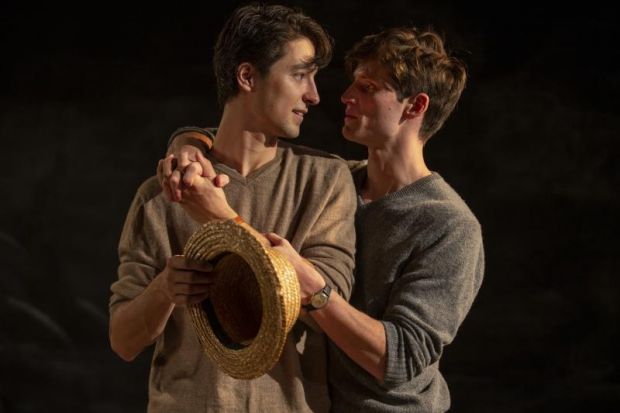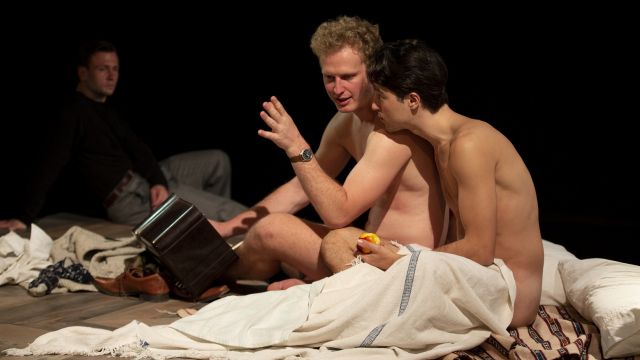Breaking the Code
In Breaking the Code, playwright Hugh Whitemore used his skill with words to craft the poignant story of Alan Turing, a man forced to hide his real self as clandestinely as he had to hide the secret work he did for his government during World War II. It is an ill-fated story and one Whitemore told with caring honesty and understanding candour.
Director Anthony Skuse embraces that caring and understanding in his incredibly creative and sensitive production of Whitemore’s play.

Together they take the audience back to Britain in the 1940s and 50s, a dark Britain ravaged firstly by war, then by the gloom of rationing and unemployment. A Britain where poverty and privilege walked side by side – and sexual ‘transgressions’ were punishable by outdated laws.
A Britain where a brilliant, homosexual mathematician and scientist who had ‘cracked’ Germany’s complicated Enigma Code and been awarded the OBE for services to his country, could be convicted of “gross indecency”, sentenced to “chemical castration” under Section 11 of the Criminal Law Enforcement Act of 1885 … and die by his own hand only 10 years after the end of the war. This is the story that Breaking the Code tells.
It's not an easy play to direct. Whitemore was a skilful writer, who saw the possibilities of juxtaposing characters over time and events. But Skuse is a skilful director; one who can translate those possibilities – the complex characters, the interplay of age and time, the social and political implications – into a production that is, in itself, quite breath-taking.

He sets the play on an open stage where lighting designer Jordan Russell subtly suggests transitions and transformations of time and place. In the background, filmmaker Patrick Phillips’ shimmering images infer deeper contexts – a leafy forest, a summery field, rustling heather, bodies diving elegantly into smooth water. He contains the action on a parquetry floor, surrounded by shadows where characters hover and watch, and a lone woman sings softly. In such a fluid atmosphere time and action are flexible.
Skuse uses his set deftly, creating pictures that are as ordered as a Renaissance painting. Light shines on immediate action, but spills over onto a standing figure here, a seated figure there, the singer in the shadows. Such attention to detail infiltrates every scene, ensuring clarity even as time, place and characters merge.

Skuse has cast a fine assembly of performers whom he directs with perceptive skill and sensitive empathy. It is a large cast. Many of the scenes are intimate and Skuse has fostered an environment of trust and confidence that infuses the production. There is a compelling aura of self-assured familiarity within which the actors work with confident belief.
The three actors that play Alan Turing – Ewan Pedley, Harry Reid and Steve Corner – establish a bright, inquisitive, intelligent scholar, acutely aware but also deeply sensitive. They take him from school to Cambridge, to Bletchley and back to academia, and as they do, they show the tension that develops when someone has to live in a world where – in Turing’s own words – “it is not possible to produce a set of rules purporting to describe what a man should do in every conceivable set of circumstances.”
Pedley, as the schoolboy Turing, plays a bright, open Alan, happy in his developing friendship with intelligent, but ill-starred Christopher (Dallas Reedman). Pedley’s Alan is innocent, unguarded, but just a little insecure and hesitant.

Reid, as the clever sciences graduate whose skill is sought by the War Office, shows the developing complexity of Turing’s character and his self-awareness. When he is ‘sounded out’ for Bletchley by the fusty, but lovably understanding Dilwynn Knox (Martin Portus), Reid’s Alan is confident, quick to question, interrogative. Later, with his colleague and close friend, Pat Green (Bridget Haberecht), he is hesitant, reticent – yet revealingly open. Reid moves gracefully on the stage, establishing a Turing more sure of himself, and his relationships, especially evident in a sensitive love scene with Nikos (Dallas Reedman).
Steve Corner plays the older Turing, cleverly incorporating all the slightly hesitant characteristics established by Pedley and Reid – a slight stutter, fidgeting hands, nail biting, wearing his tie around his waist – yet with a different sort of confidence. This Alan is acutely aware of who he is, and of the dangers he faces as he admits his relationship with the venal, grasping Ron Miller (Igor Bulanov) to the police – and the difficulty of disclosing his sexuality to his mother. Corner’s performance encompasses all the self-awareness, strength and intellect that has been developed by Pedley and Reid, and adds the debilitating anguish of humiliation.

Jess Vince-Moin and Leilani Loau play Turing’s mother, Sara. Vince-Moin is the younger Sara, ambitious for her bright son, keen for him to make friends. Loau is a more mature Sara. She has weathered the war and Alan’s secret ‘service’. She is reticent, a little brusque, but still protective and proud. Both contrast with Bridget Haberecht’s Pat, who is intelligently perceptive, encouragingly open and accepting.
“Authority” is represented by the diffident but determined Detective Sergeant Rimmer, played by Jason Jefferies, and John Grinston, who plays the haughty, imperious John Smith.
Naomi Belet is the shadowy voice that filters through the action plaintively, nostalgically, full of the melancholy that pervades the action.

It is courageous to take on a play such as this; just as courageous as those like Alan Turing who braved outdated, restrictive laws to be themselves – and, eventually, saw some of them changed. Without their courage, plays such as this would not be selected for mainstream stages – and we would not see fine productions such as this … historically accurate, delicately directed, sensitively performed, gently provocative.
Anthony Skuse and his very talented creatives and courageous performers give us a play that is of the past, but still very much of the present. There is much still to change.
Carol Wimmer
Photographer: © Bob Seary
Subscribe to our E-Newsletter, buy our latest print edition or find a Performing Arts book at Book Nook.

